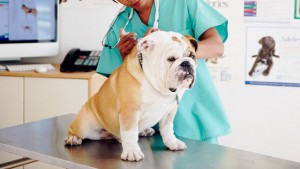
Canine influenza is certainly a concern every year, but this winter veterinarians across the country are noticing an increase in the number of suspected cases; particularly in the Chicago area. According to veterinarians and experts in the area, Chicagoland hasn’t seen an outbreak of dog flu like this since 2008.
Dr. Natalie Marks, a veterinarian at Blum Animal Hospital in the city, says that there has been a large outbreak of infectious respiratory diseases in and around the Chicago area over the last few months.
She warns dog owners that the symptoms of dog flu are much more severe than those of kennel cough, and pet owners should be aware of what they are. They can include: lethargy, coughing, sneezing, rapid or difficult breathing, a varying fever, loss of appetite, and clear discharge from the nose that progresses to thick yellow/green mucus.
RELATED: What You Need to Know About Poison Prevention for Dogs
Dogs with canine influenza become sick very quickly, usually in the span of one to three days. It is also a very contagious disease, so dogs that are exposed to other pets at dog parks and doggy day care are most susceptible. It is up to pet owners to monitor their dogs health and notice any symptoms quickly.

There is a flu shot available for canines, and vets typically recommend it to dogs that are exposed to other pets on a regular basis. Just like the human vaccine, it cannot be administered to dogs that are already sick, and the risks are minimal.
Because there is no Center for Disease Control for animals, vets in the area are urging dog owners to take special precautions. Their best advice is to reconsider taking your dog to places where they could be exposed to the virus. Hopefully within the next couple of weeks the virus will be controlled and it will be safe to bring your dog back to public places again, but until then, its better safe than sorry.
RELATED: 11 Vital Tips on How to Take Care of a Dog
Some dogs have reportedly died recently from the virus, but none of the cases have been confirmed to be canine influenza. Some experts believe it was just kennel cough.
There are no specific antiviral medications available to cure canine influenza, but appropriate care must be taken, and any dog with the illness should be monitored closely by a veterinarian. Treatment for the virus itself is very similar to humans; let it run its course. However, if the virus goes untreated for a length of time secondary complications may develop, including pneumonia, which could be fatal.












